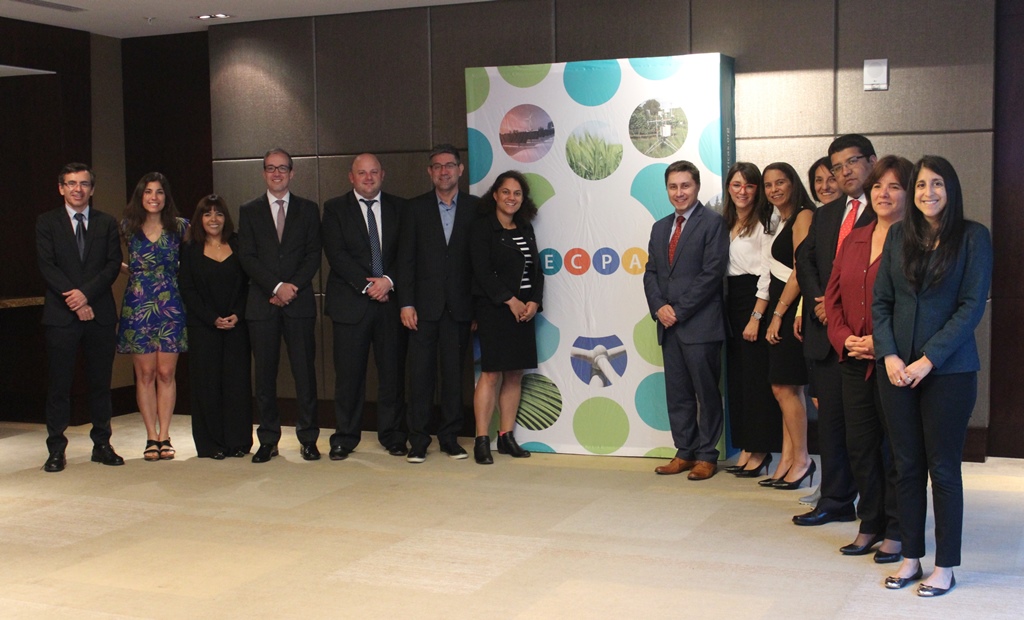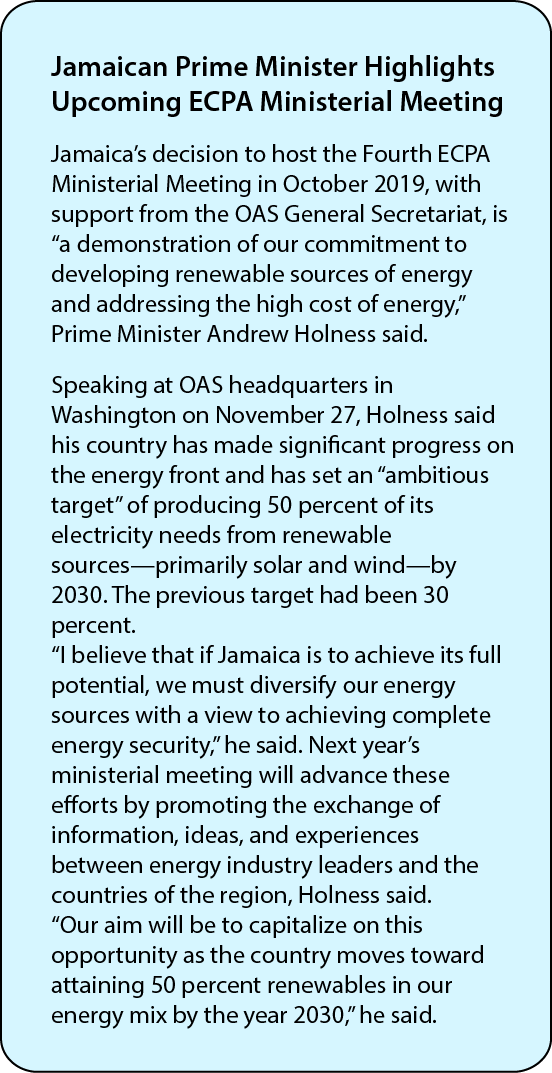

 Ambassador Audrey Marks, Jamaica’s top diplomat to the Organization of American States (OAS) and to the U.S. government, said preparations are already “in high gear” for the ministerial meeting, which will focus on the theme “Energy Resilience and Investment Opportunities.”
Ambassador Audrey Marks, Jamaica’s top diplomat to the Organization of American States (OAS) and to the U.S. government, said preparations are already “in high gear” for the ministerial meeting, which will focus on the theme “Energy Resilience and Investment Opportunities.”
“We think energy is such an important part of our development goals, so we are pleased to be able to host the next ministerial,” Marks said in an interview with ECPA. She underscored that although Jamaica will serve as official host, the event will be a collaborative effort with support from many different players, including the OAS, the Inter-American Development Bank (IDB), the U.S. Department of Energy, and the private sector.
“This is truly a public-private partnership for the real development of energy in the region,” she said.
Given the diversity of the Americas and countries’ different energy situations, the ministerial meeting will include side events to examine a range of topics that may warrant subregional or hemisphere-wide cooperation. At the recent preparatory meeting, held on November 7 in Miami, the Jamaican delegation proposed several topics, and participants from other countries added their own ideas.
Here is just a sampling of the potential items on the menu for Jamaica:
The region’s diversity was reflected within each topic. On bioenergy, for example, Brazil stressed the “vital role” of biofuels in reducing carbon emissions, while Chile encouraged a broad perspective on bioenergy that covers not only transportation but the continued use of firewood in some countries. Another aspect discussed was the use of biomass energy to generate electricity or to power industrial processes.
A second and final preparatory meeting will be held in April in Costa Rica to further define the agenda for the ECPA ministerial meeting.
Participants also talked about the private sector’s critical role in implementing energy policy. As in the case of the Summit of the Americas process in general, the region’s energy ministers have an opportunity to engage with the Americas Business Dialogue, a private sector-led initiative facilitated by the IDB to promote high-level policy dialogue between the public and private sectors in the region. Several participants also emphasized the importance of including representatives of small and medium-size businesses in discussions about energy and resilience.
The meeting in Jamaica will build on the progress made at the Third ECPA Ministerial Meeting, which took place in November 2017 in Viña del Mar, Chile, with the participation of 25 countries. A detailed Action Plan adopted at that meeting is helping to guide steps the countries are taking on the key pillars of ECPA: energy efficiency, renewable energy, efficient use of fossil fuels, energy infrastructure, energy poverty, regional energy integration, and energy research and innovation.
María Cristina Silva Parejas, Coordinator of Multilateral Affairs in the International Department of Chile’s Ministry of Energy, stressed the importance of ECPA as the principal platform by which countries in the region can coordinate strategies and share expertise on energy issues, across and within the hemisphere’s subregions. She called for ECPA to increase its engagement with other regional organizations, multilateral banks, and development agencies.
For her part, Ambassador Marks of Jamaica conveyed her government’s commitment to the success of next year’s ministerial meeting and talked more broadly about the importance of clean, affordable energy to the Caribbean region, where high fuel prices have historically put a damper on development. The Jamaican government, led by Andrew Holness, has been acting on several fronts to expand clean energy—such as installing solar panels at the Office of the Prime Minister as a “demonstration from the very top,” she said.
In an interview, she said that Jamaica’s energy strategy fits into an “aggressive growth agenda” of 5 percent per year. “We are looking at all the elements that can make that growth agenda work, and energy’s a big one,” the Ambassador said.
Expanding the use of renewables such as solar and wind not only helps to reduce the use of fossil fuels and advance climate goals; it also makes good economic sense, she said. “While we like the forward thinking of protecting our environment, clean energy, and all of those usual good things, we are really mostly driven by the bottom line,” she said. “We believe that it is a good investment all around.”
See event photos, here.
 View Map
View Map